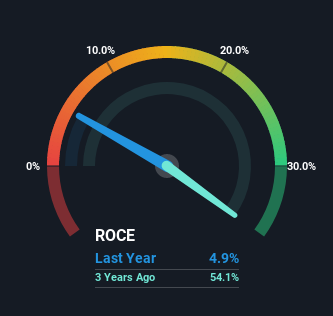- Hong Kong
- /
- Consumer Services
- /
- SEHK:1769
Returns On Capital At Scholar Education Group (HKG:1769) Paint A Concerning Picture

If you're not sure where to start when looking for the next multi-bagger, there are a few key trends you should keep an eye out for. Ideally, a business will show two trends; firstly a growing return on capital employed (ROCE) and secondly, an increasing amount of capital employed. If you see this, it typically means it's a company with a great business model and plenty of profitable reinvestment opportunities. Although, when we looked at Scholar Education Group (HKG:1769), it didn't seem to tick all of these boxes.
Return On Capital Employed (ROCE): What is it?
If you haven't worked with ROCE before, it measures the 'return' (pre-tax profit) a company generates from capital employed in its business. The formula for this calculation on Scholar Education Group is:
Return on Capital Employed = Earnings Before Interest and Tax (EBIT) ÷ (Total Assets - Current Liabilities)
0.049 = CN¥45m ÷ (CN¥1.5b - CN¥563m) (Based on the trailing twelve months to June 2021).
Therefore, Scholar Education Group has an ROCE of 4.9%. Ultimately, that's a low return and it under-performs the Consumer Services industry average of 8.6%.
See our latest analysis for Scholar Education Group

In the above chart we have measured Scholar Education Group's prior ROCE against its prior performance, but the future is arguably more important. If you'd like to see what analysts are forecasting going forward, you should check out our free report for Scholar Education Group.
So How Is Scholar Education Group's ROCE Trending?
In terms of Scholar Education Group's historical ROCE movements, the trend isn't fantastic. Around four years ago the returns on capital were 44%, but since then they've fallen to 4.9%. However, given capital employed and revenue have both increased it appears that the business is currently pursuing growth, at the consequence of short term returns. If these investments prove successful, this can bode very well for long term stock performance.
On a related note, Scholar Education Group has decreased its current liabilities to 38% of total assets. That could partly explain why the ROCE has dropped. What's more, this can reduce some aspects of risk to the business because now the company's suppliers or short-term creditors are funding less of its operations. Since the business is basically funding more of its operations with it's own money, you could argue this has made the business less efficient at generating ROCE.
Our Take On Scholar Education Group's ROCE
In summary, despite lower returns in the short term, we're encouraged to see that Scholar Education Group is reinvesting for growth and has higher sales as a result. Despite these promising trends, the stock has collapsed 90% over the last year, so there could be other factors hurting the company's prospects. Regardless, reinvestment can pay off in the long run, so we think astute investors may want to look further into this stock.
Scholar Education Group does have some risks though, and we've spotted 6 warning signs for Scholar Education Group that you might be interested in.
If you want to search for solid companies with great earnings, check out this free list of companies with good balance sheets and impressive returns on equity.
New: Manage All Your Stock Portfolios in One Place
We've created the ultimate portfolio companion for stock investors, and it's free.
• Connect an unlimited number of Portfolios and see your total in one currency
• Be alerted to new Warning Signs or Risks via email or mobile
• Track the Fair Value of your stocks
Have feedback on this article? Concerned about the content? Get in touch with us directly. Alternatively, email editorial-team (at) simplywallst.com.
This article by Simply Wall St is general in nature. We provide commentary based on historical data and analyst forecasts only using an unbiased methodology and our articles are not intended to be financial advice. It does not constitute a recommendation to buy or sell any stock, and does not take account of your objectives, or your financial situation. We aim to bring you long-term focused analysis driven by fundamental data. Note that our analysis may not factor in the latest price-sensitive company announcements or qualitative material. Simply Wall St has no position in any stocks mentioned.
About SEHK:1769
Scholar Education Group
An investment holding company, provides K-12 after-school education services in the People’s Republic of China.
Flawless balance sheet with moderate growth potential.

